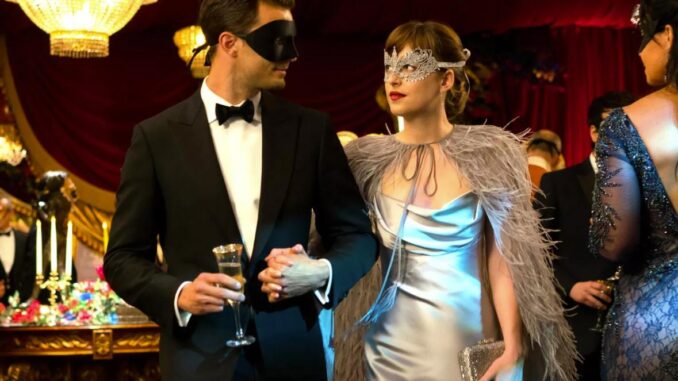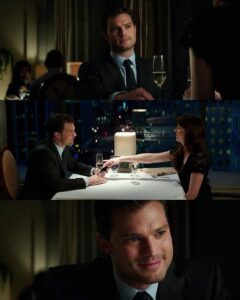
Romance is more or less dead in studio movies—neither the romantic comedy nor the romantic drama has remained a big-ticket item—but this week it returns in “Fifty Shades Freed,” in a form that is best summarized by a song from the Depression-era musical “Gold Diggers of 1937”: “Oh, baby, what I couldn’t do (ooh-ooh), with plenty of money and you (ooh-ooh).” The last film in the trilogy is an alternately breezy and tense tale of marital accord, conflict, and reconciliation, set against a background of fabulous and seemingly effortless wealth and the many difficulties that it poses.

The notion isn’t all facetious, either, not even in the slight, simplistic, utterly undeveloped paces through which the film puts its newlyweds, Anastasia (a.k.a. Ana) Steele (Dakota Johnson) and Christian Grey (Jamie Dornan). They escape from their lavish wedding party and are whisked to a nearby airport, where they board Christian’s private jet—or, rather, as he instantly reminds her, their private jet. (Those new tax breaks will certainly come in handy.) What’s his is hers, but, when they get home and Ana shows up at her office at the book publisher Seattle Independent Press (ludicrously discovering that, in her absence, she has been promoted to chief fiction editor), she hesitates about making what’s his—namely, his name—hers. At home, to her domestic staff, she’s Mrs. Grey (though she’d prefer to be called Ana), but at work she wants to remain Ms. Steele, to keep her own working identity and not convey the impression that she owes her position to her husband (who has, in fact, bought the company—picking up on a gag from the second film in the series, he’s her boss’s boss’s boss). Christian, discovering that she’s using the name Steele rather than Grey in her office communications, has a hissy fit; then he gets over it.
Arriving home with Christian in his—sorry, their—sleek and vast apartment occupying mansion-like terrain inside a modern high-rise apartment building, Ana is taught the rules of the game: she can go nowhere without a member of her security detail, because wealth and fame make her a potential target of robbers and kidnappers. Daily life has become complicated, and what she used to do effortlessly and unthinkingly—going out, seeing friends, driving—is now a logistical labyrinth (though, fortunately, there’s a chief of staff at home to keep the system running smoothly). When the couple heads out to a remote old lakeside house, Christian insists on taking their Autobahn-ready Audi, which she’d like to drive. But first they’re met at the intricately ramshackle old manse by an architect named Gia Matteo (Arielle Kebbel), who flirts brutally with Christian. (The come-on line is an all-time howler: “I love what you’re doing in Africa.”) In a moment alone together, Ana gets her power moment and delivers it, putting Gia in her place with a lacerating insult that only the high-handed rich patron could get away with. The dispute, however, pivots not just on flirtation but on architecture and its uses: Gia proposes to tear the house down and is showing off her plans to rebuild a modern one on its site. But Ana wants to keep and renovate the old house, maintaining its charm while upgrading its facilities.

Such problems. Yet amid the blatantly empty fantasy is a scintilla of substance. What the Grey fortune suddenly offers Ana is the power to do anything—it’s a sort of magic lantern that threatens to become a tragic lantern. Tear a house down and rebuild? Sure. Fly to a distant resort? Why not. Buy out a boutique’s stock of clothing? Certainly. But head off unaccompanied to have drinks with a friend? Trouble awaits. Take the wheel of a car and zip down a country road? A nefarious hot pursuit ensues. (Ana, as it turns out, has 007-level evasive skills that she casually displays in the moment of truth.) The subject of “Fifty Shades Freed” is that the rich, as F. Scott Fitzgerald said, are different—and that the introduction of the non-rich into their midst, through marriage, is the only thing that keeps them tethered to the ground like everyone else. But, in the process, the non-rich person grafted into the wealthy family—even as she (or he) bends wealth toward human ends—has to take on the burden of the new and constraining milieu, has to bear up under the restrictions and limitations of wealth.
Fortunately, Ana faces up to the challenges brilliantly, albeit in a plot twist that veers from the melodramatic to the grotesque. Keeping spoilers to a minimum, it’s an unplanned pregnancy, which catapults Christian into a quasi-adolescent crisis and threatens the marriage. But resolution appears in the form of a villain ex machina, Jack Hyde (Eric Johnson), Ana’s former boss, who threatens violence and whom Ana, morphing from editor to vigilante, takes on alone, both bravely and ingeniously. In effect, she takes one for the family, proving herself to be a ferocious mo
